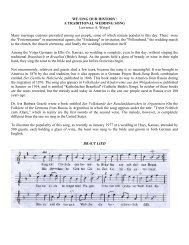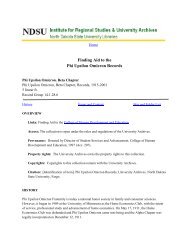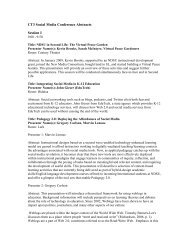germans from russia in fort collins, 1900-2000 - Libraries
germans from russia in fort collins, 1900-2000 - Libraries
germans from russia in fort collins, 1900-2000 - Libraries
You also want an ePaper? Increase the reach of your titles
YUMPU automatically turns print PDFs into web optimized ePapers that Google loves.
SECTION I<br />
Germans <strong>in</strong> Russia and the United States<br />
Germans <strong>in</strong> Russia<br />
The story of Germans <strong>from</strong> Russia <strong>in</strong><br />
Fort Coll<strong>in</strong>s actually beg<strong>in</strong>s <strong>in</strong> the small<br />
P<strong>russia</strong>n pr<strong>in</strong>cipality of Anhalt-Zerbst. There,<br />
<strong>in</strong> 1729, Sophie Friederike Auguste, daughter<br />
of Lutheran Pr<strong>in</strong>ce Christian Auguste was<br />
born. In 1745, Empress Elizabeth of Russia<br />
selected the young girl to marry her nephew,<br />
future Tsar Peter III. Acquir<strong>in</strong>g the moniker<br />
Cather<strong>in</strong>e, the young girl began to absorb<br />
Russian culture and customs. In time, she<br />
mastered the language, learn<strong>in</strong>g to speak<br />
without a telltale German accent, and she<br />
converted to the Orthodox faith. On<br />
Christmas Day 1761, Elizabeth died and,<br />
ascend<strong>in</strong>g to the throne, Peter promptly ended<br />
the military conflict historians would later<br />
term the Seven Years’ War (1756-63). But the<br />
armistice turned the Russian army aga<strong>in</strong>st the<br />
tsar, already considered impotent and <strong>in</strong>competent<br />
as symptoms of his mental illness grew<br />
more apparent. With her lover Grigori Orlov,<br />
Cather<strong>in</strong>e overthrew her husband. The<br />
dethroned tsar died under mysterious circumstances<br />
eight days later. 7<br />
While Tsar<strong>in</strong>a Cather<strong>in</strong>e II, better known<br />
as Cather<strong>in</strong>e the Great, was fluent <strong>in</strong> Russian<br />
culture, she considered many of the peoples<br />
<strong>in</strong> her expand<strong>in</strong>g realm as primitive and backwards.<br />
She sought to create <strong>in</strong> St. Petersburg<br />
the splendor of the French court at Versailles<br />
and br<strong>in</strong>g Western European thought and culture<br />
to Russia, pursu<strong>in</strong>g the goals of Tsar<br />
Peter I (reigned 1682-1725). As an “enlightened<br />
despot,” Cather<strong>in</strong>e embarked upon an<br />
ambitious plan of reform that <strong>in</strong>cluded settl<strong>in</strong>g<br />
Western European farmers on Russia’s<br />
eastern frontier. She also viewed these settlers<br />
as a human buffer between her civilized<br />
empire and Asiatic <strong>in</strong>vaders. Only three<br />
weeks <strong>in</strong>to her reign, Cather<strong>in</strong>e issued her<br />
first manifesto, <strong>in</strong>vit<strong>in</strong>g all peoples (except<br />
Jews) to settle <strong>in</strong> her empire. The <strong>in</strong>vitation<br />
met with little response. One year later, she<br />
issued a second manifesto that would become<br />
the basis for German settlement <strong>in</strong> the Volga<br />
River region and north of the Black Sea. 8 In<br />
the manifesto, Cather<strong>in</strong>e promised prospective<br />
Western European settlers:<br />
1. Permission to settle where they<br />
wished;<br />
2. Freedom of religion;<br />
3. Thirty-years of tax exemption for<br />
those settl<strong>in</strong>g <strong>in</strong> underdeveloped<br />
areas;<br />
4. Perpetual exemption <strong>from</strong> military<br />
service;<br />
5. Ten-year, <strong>in</strong>terest-free loans to build<br />
homes and buy farm<strong>in</strong>g equipment;<br />
6. The ability to buy serfs and peasants if<br />
those settlers established new k<strong>in</strong>ds of<br />
factories with their own money;<br />
7. Free transportation <strong>from</strong> embarkation<br />
to dest<strong>in</strong>ation;<br />
8. An unspecified amount of “board<br />
money” when they reported to the<br />
Tutelary Chancellery, which had been<br />
established by Cather<strong>in</strong>e to oversee<br />
the manifesto and whose offices were<br />
<strong>in</strong> St. Petersburg and other border<br />
cities; and<br />
9. Permission to return to their lands of<br />
Page 1

















